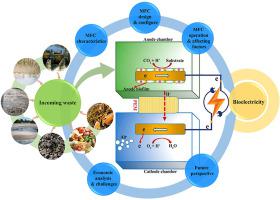Chemosphere ( IF 8.1 ) Pub Date : 2021-09-21 , DOI: 10.1016/j.chemosphere.2021.132285 Anh Tuan Hoang , Sandro Nižetić , Kim Hoong Ng , Agis M. Papadopoulos , Anh Tuan Le , Sunil Kumar , H. Hadiyanto , Van Viet Pham

|
Microbial fuel cell (MFC) is lauded for its potentials to solve both energy crisis and environmental pollution. Technologically, it offers the capability to harness electricity from the chemical energy stored in the organic substrate with no intermediate steps, thereby minimizes the entropic loss due to the inter-conversion of energy. The sciences underneath such MFCs include the electron and proton generation from the metabolic decomposition of the substrate by microbes at the anode, followed by the shuttling of these charges to cathode for electricity generation. While its promising prospects were mutually evinced in the past investigations, the upscaling of MFC in sustaining global energy demands and waste treatments is yet to be put into practice. In this context, the current review summarizes the important knowledge and applications of MFCs, concurrently identifies the technological bottlenecks that restricted its vast implementation. In addition, economic analysis was also performed to provide multiangle perspectives to readers. Succinctly, MFCs are mainly hindered by the slow metabolic kinetics, sluggish transfer of charged particles, and low economic competitiveness when compared to conventional technologies. From these hindering factors, insightful strategies for improved practicality of MFCs were formulated, with potential future research direction being identified too. With proper planning, we are delighted to see the industrialization of MFCs in the near future, which would benefit the entire human race with cleaner energy and the environment.
中文翻译:

用于从废物中生产生物电的微生物燃料电池是未来能源部门的可持续前景
微生物燃料电池 (MFC) 因其在解决能源危机和环境污染方面的潜力而备受赞誉。从技术上讲,它提供了从存储在有机基板中的化学能中获取电能的能力,无需中间步骤,从而最大限度地减少由于能量相互转换造成的熵损失。这种 MFC 背后的科学包括阳极微生物对底物的代谢分解产生电子和质子,然后将这些电荷穿梭到阴极以发电。虽然在过去的调查中相互证明了其充满希望的前景,但 MFC 在维持全球能源需求和废物处理方面的升级尚未付诸实践。在此背景下,本综述总结了 MFCs 的重要知识和应用,同时确定了限制其广泛实施的技术瓶颈。此外,还进行了经济分析,为读者提供多角度的视角。简而言之,与传统技术相比,MFCs主要受到代谢动力学缓慢、带电粒子转移缓慢和经济竞争力低的阻碍。从这些阻碍因素中,制定了提高 MFC 实用性的有见地的策略,并确定了未来潜在的研究方向。如果规划得当,我们很高兴在不久的将来看到 MFC 的产业化,这将以更清洁的能源和环境造福全人类。还进行了经济分析,以向读者提供多角度的观点。简而言之,与传统技术相比,MFCs主要受到代谢动力学缓慢、带电粒子转移缓慢和经济竞争力低的阻碍。从这些阻碍因素中,制定了提高 MFC 实用性的有见地的策略,并确定了未来潜在的研究方向。如果规划得当,我们很高兴在不久的将来看到 MFC 的产业化,这将以更清洁的能源和环境造福全人类。还进行了经济分析,以向读者提供多角度的观点。简而言之,与传统技术相比,MFCs主要受到代谢动力学缓慢、带电粒子转移缓慢和经济竞争力低的阻碍。从这些阻碍因素中,制定了提高 MFC 实用性的有见地的策略,并确定了未来潜在的研究方向。如果规划得当,我们很高兴在不久的将来看到 MFC 的产业化,这将以更清洁的能源和环境造福全人类。从这些阻碍因素中,制定了提高 MFC 实用性的有见地的策略,并确定了未来潜在的研究方向。如果规划得当,我们很高兴在不久的将来看到 MFC 的产业化,这将以更清洁的能源和环境造福全人类。从这些阻碍因素中,制定了提高 MFC 实用性的有见地的策略,并确定了未来潜在的研究方向。如果规划得当,我们很高兴在不久的将来看到 MFC 的产业化,这将以更清洁的能源和环境造福全人类。











































 京公网安备 11010802027423号
京公网安备 11010802027423号